CISG Application: Analyzing a Case Study in International Trade
VerifiedAdded on 2023/06/13
|6
|1425
|299
Case Study
AI Summary
This case study delves into the application of the United Nations Convention on Contracts for the International Sale of Goods (CISG) to a contract dispute between BigMi, a company headquartered in China, and a supplier based in California. The analysis addresses whether the CISG applies, considering BigMi's New York branch involvement and the delivery destination. It examines key CISG articles related to offer, acceptance, breach of contract, and remedies. The case highlights BigMi's breach by failing to issue a letter of credit after the goods were shipped, leading to potential damages claimable by the seller under CISG provisions. Desklib provides students access to similar solved assignments and past papers.
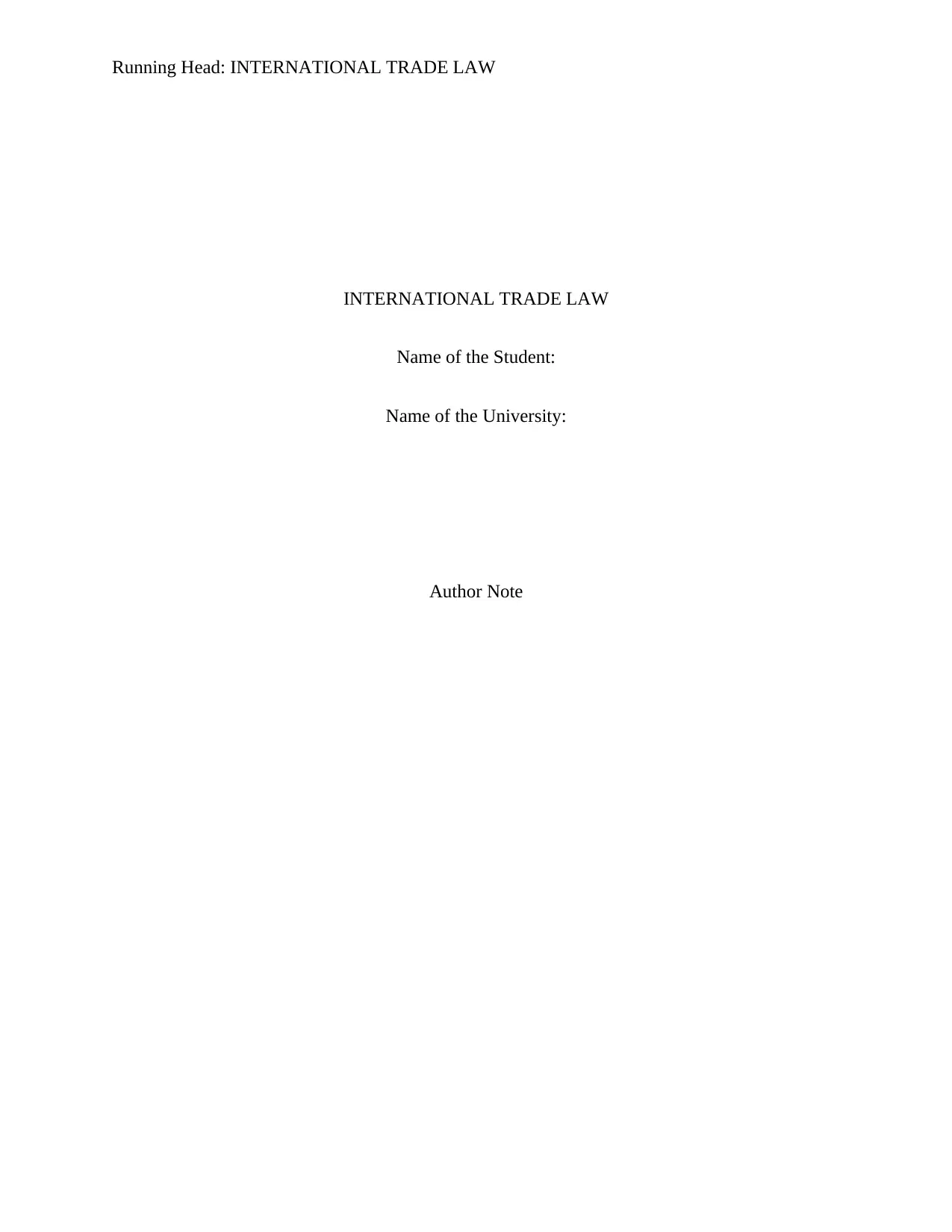
Running Head: INTERNATIONAL TRADE LAW
INTERNATIONAL TRADE LAW
Name of the Student:
Name of the University:
Author Note
INTERNATIONAL TRADE LAW
Name of the Student:
Name of the University:
Author Note
Paraphrase This Document
Need a fresh take? Get an instant paraphrase of this document with our AI Paraphraser
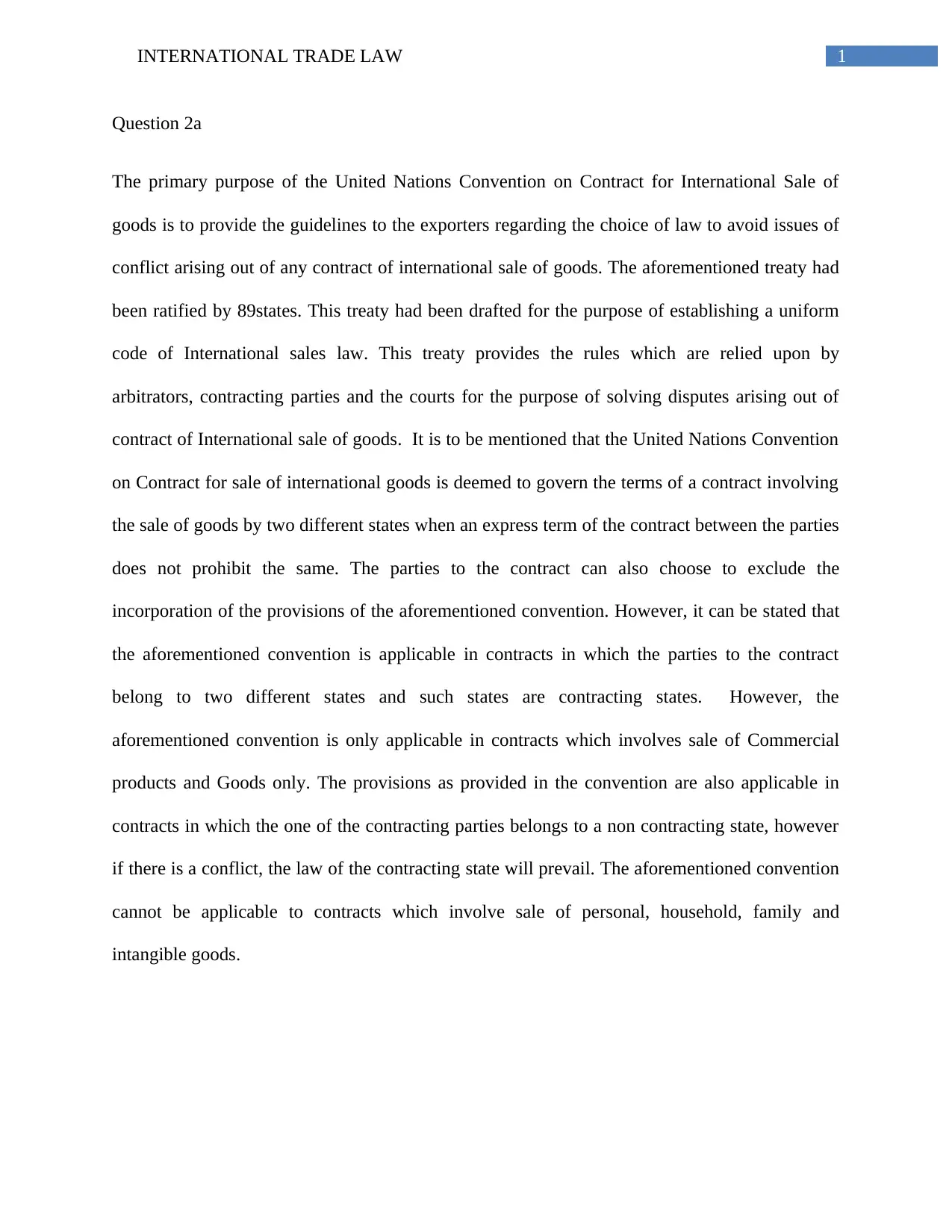
1INTERNATIONAL TRADE LAW
Question 2a
The primary purpose of the United Nations Convention on Contract for International Sale of
goods is to provide the guidelines to the exporters regarding the choice of law to avoid issues of
conflict arising out of any contract of international sale of goods. The aforementioned treaty had
been ratified by 89states. This treaty had been drafted for the purpose of establishing a uniform
code of International sales law. This treaty provides the rules which are relied upon by
arbitrators, contracting parties and the courts for the purpose of solving disputes arising out of
contract of International sale of goods. It is to be mentioned that the United Nations Convention
on Contract for sale of international goods is deemed to govern the terms of a contract involving
the sale of goods by two different states when an express term of the contract between the parties
does not prohibit the same. The parties to the contract can also choose to exclude the
incorporation of the provisions of the aforementioned convention. However, it can be stated that
the aforementioned convention is applicable in contracts in which the parties to the contract
belong to two different states and such states are contracting states. However, the
aforementioned convention is only applicable in contracts which involves sale of Commercial
products and Goods only. The provisions as provided in the convention are also applicable in
contracts in which the one of the contracting parties belongs to a non contracting state, however
if there is a conflict, the law of the contracting state will prevail. The aforementioned convention
cannot be applicable to contracts which involve sale of personal, household, family and
intangible goods.
Question 2a
The primary purpose of the United Nations Convention on Contract for International Sale of
goods is to provide the guidelines to the exporters regarding the choice of law to avoid issues of
conflict arising out of any contract of international sale of goods. The aforementioned treaty had
been ratified by 89states. This treaty had been drafted for the purpose of establishing a uniform
code of International sales law. This treaty provides the rules which are relied upon by
arbitrators, contracting parties and the courts for the purpose of solving disputes arising out of
contract of International sale of goods. It is to be mentioned that the United Nations Convention
on Contract for sale of international goods is deemed to govern the terms of a contract involving
the sale of goods by two different states when an express term of the contract between the parties
does not prohibit the same. The parties to the contract can also choose to exclude the
incorporation of the provisions of the aforementioned convention. However, it can be stated that
the aforementioned convention is applicable in contracts in which the parties to the contract
belong to two different states and such states are contracting states. However, the
aforementioned convention is only applicable in contracts which involves sale of Commercial
products and Goods only. The provisions as provided in the convention are also applicable in
contracts in which the one of the contracting parties belongs to a non contracting state, however
if there is a conflict, the law of the contracting state will prevail. The aforementioned convention
cannot be applicable to contracts which involve sale of personal, household, family and
intangible goods.
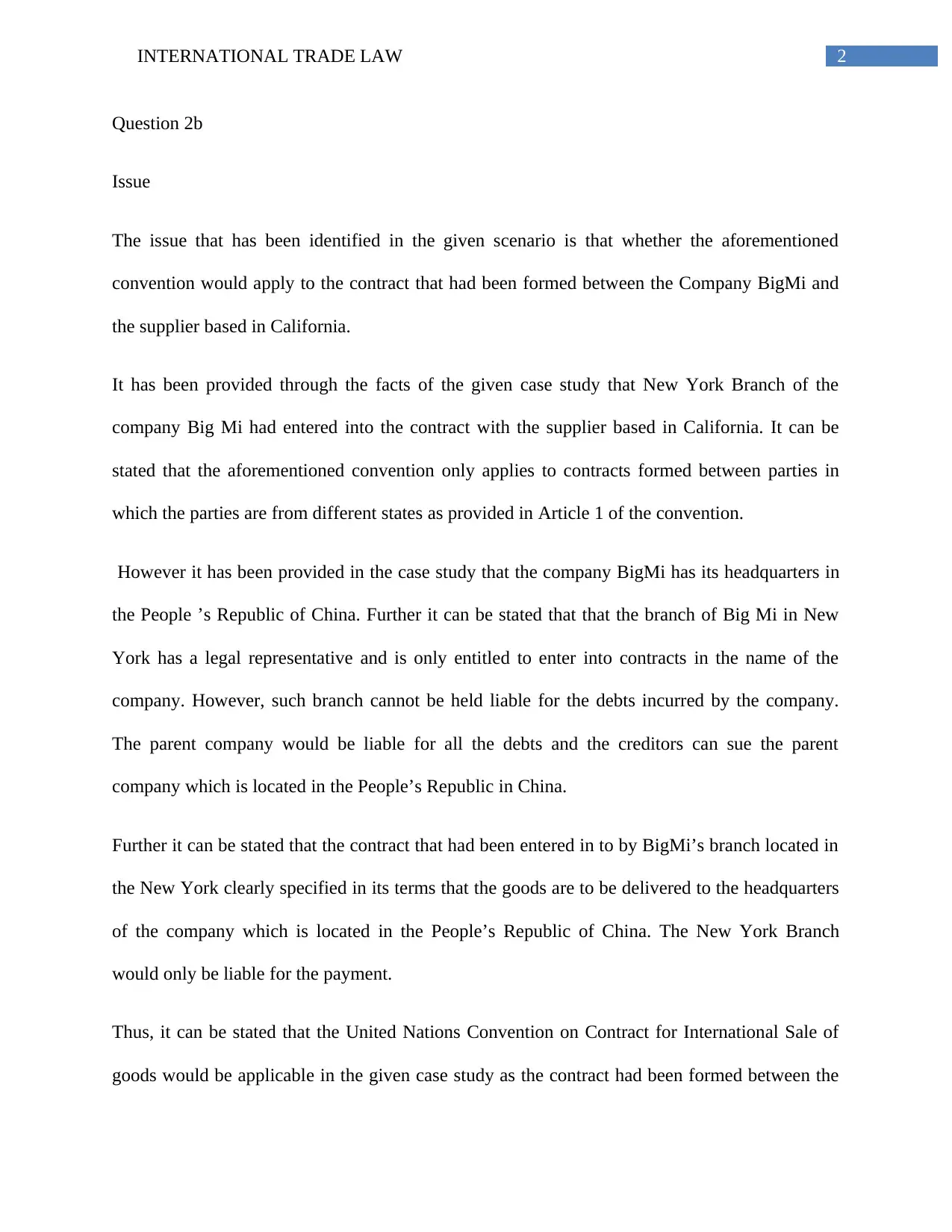
2INTERNATIONAL TRADE LAW
Question 2b
Issue
The issue that has been identified in the given scenario is that whether the aforementioned
convention would apply to the contract that had been formed between the Company BigMi and
the supplier based in California.
It has been provided through the facts of the given case study that New York Branch of the
company Big Mi had entered into the contract with the supplier based in California. It can be
stated that the aforementioned convention only applies to contracts formed between parties in
which the parties are from different states as provided in Article 1 of the convention.
However it has been provided in the case study that the company BigMi has its headquarters in
the People ’s Republic of China. Further it can be stated that that the branch of Big Mi in New
York has a legal representative and is only entitled to enter into contracts in the name of the
company. However, such branch cannot be held liable for the debts incurred by the company.
The parent company would be liable for all the debts and the creditors can sue the parent
company which is located in the People’s Republic in China.
Further it can be stated that the contract that had been entered in to by BigMi’s branch located in
the New York clearly specified in its terms that the goods are to be delivered to the headquarters
of the company which is located in the People’s Republic of China. The New York Branch
would only be liable for the payment.
Thus, it can be stated that the United Nations Convention on Contract for International Sale of
goods would be applicable in the given case study as the contract had been formed between the
Question 2b
Issue
The issue that has been identified in the given scenario is that whether the aforementioned
convention would apply to the contract that had been formed between the Company BigMi and
the supplier based in California.
It has been provided through the facts of the given case study that New York Branch of the
company Big Mi had entered into the contract with the supplier based in California. It can be
stated that the aforementioned convention only applies to contracts formed between parties in
which the parties are from different states as provided in Article 1 of the convention.
However it has been provided in the case study that the company BigMi has its headquarters in
the People ’s Republic of China. Further it can be stated that that the branch of Big Mi in New
York has a legal representative and is only entitled to enter into contracts in the name of the
company. However, such branch cannot be held liable for the debts incurred by the company.
The parent company would be liable for all the debts and the creditors can sue the parent
company which is located in the People’s Republic in China.
Further it can be stated that the contract that had been entered in to by BigMi’s branch located in
the New York clearly specified in its terms that the goods are to be delivered to the headquarters
of the company which is located in the People’s Republic of China. The New York Branch
would only be liable for the payment.
Thus, it can be stated that the United Nations Convention on Contract for International Sale of
goods would be applicable in the given case study as the contract had been formed between the
⊘ This is a preview!⊘
Do you want full access?
Subscribe today to unlock all pages.

Trusted by 1+ million students worldwide
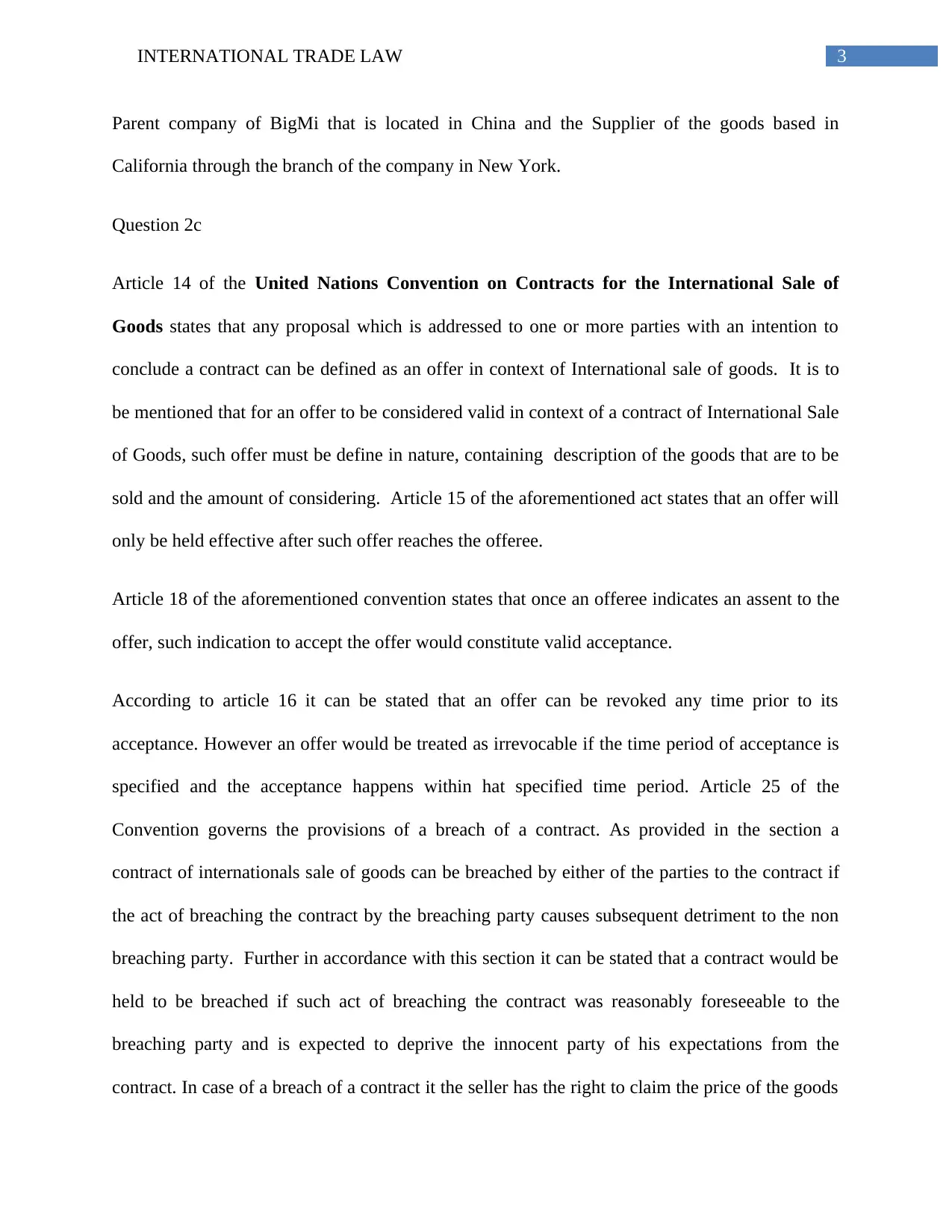
3INTERNATIONAL TRADE LAW
Parent company of BigMi that is located in China and the Supplier of the goods based in
California through the branch of the company in New York.
Question 2c
Article 14 of the United Nations Convention on Contracts for the International Sale of
Goods states that any proposal which is addressed to one or more parties with an intention to
conclude a contract can be defined as an offer in context of International sale of goods. It is to
be mentioned that for an offer to be considered valid in context of a contract of International Sale
of Goods, such offer must be define in nature, containing description of the goods that are to be
sold and the amount of considering. Article 15 of the aforementioned act states that an offer will
only be held effective after such offer reaches the offeree.
Article 18 of the aforementioned convention states that once an offeree indicates an assent to the
offer, such indication to accept the offer would constitute valid acceptance.
According to article 16 it can be stated that an offer can be revoked any time prior to its
acceptance. However an offer would be treated as irrevocable if the time period of acceptance is
specified and the acceptance happens within hat specified time period. Article 25 of the
Convention governs the provisions of a breach of a contract. As provided in the section a
contract of internationals sale of goods can be breached by either of the parties to the contract if
the act of breaching the contract by the breaching party causes subsequent detriment to the non
breaching party. Further in accordance with this section it can be stated that a contract would be
held to be breached if such act of breaching the contract was reasonably foreseeable to the
breaching party and is expected to deprive the innocent party of his expectations from the
contract. In case of a breach of a contract it the seller has the right to claim the price of the goods
Parent company of BigMi that is located in China and the Supplier of the goods based in
California through the branch of the company in New York.
Question 2c
Article 14 of the United Nations Convention on Contracts for the International Sale of
Goods states that any proposal which is addressed to one or more parties with an intention to
conclude a contract can be defined as an offer in context of International sale of goods. It is to
be mentioned that for an offer to be considered valid in context of a contract of International Sale
of Goods, such offer must be define in nature, containing description of the goods that are to be
sold and the amount of considering. Article 15 of the aforementioned act states that an offer will
only be held effective after such offer reaches the offeree.
Article 18 of the aforementioned convention states that once an offeree indicates an assent to the
offer, such indication to accept the offer would constitute valid acceptance.
According to article 16 it can be stated that an offer can be revoked any time prior to its
acceptance. However an offer would be treated as irrevocable if the time period of acceptance is
specified and the acceptance happens within hat specified time period. Article 25 of the
Convention governs the provisions of a breach of a contract. As provided in the section a
contract of internationals sale of goods can be breached by either of the parties to the contract if
the act of breaching the contract by the breaching party causes subsequent detriment to the non
breaching party. Further in accordance with this section it can be stated that a contract would be
held to be breached if such act of breaching the contract was reasonably foreseeable to the
breaching party and is expected to deprive the innocent party of his expectations from the
contract. In case of a breach of a contract it the seller has the right to claim the price of the goods
Paraphrase This Document
Need a fresh take? Get an instant paraphrase of this document with our AI Paraphraser
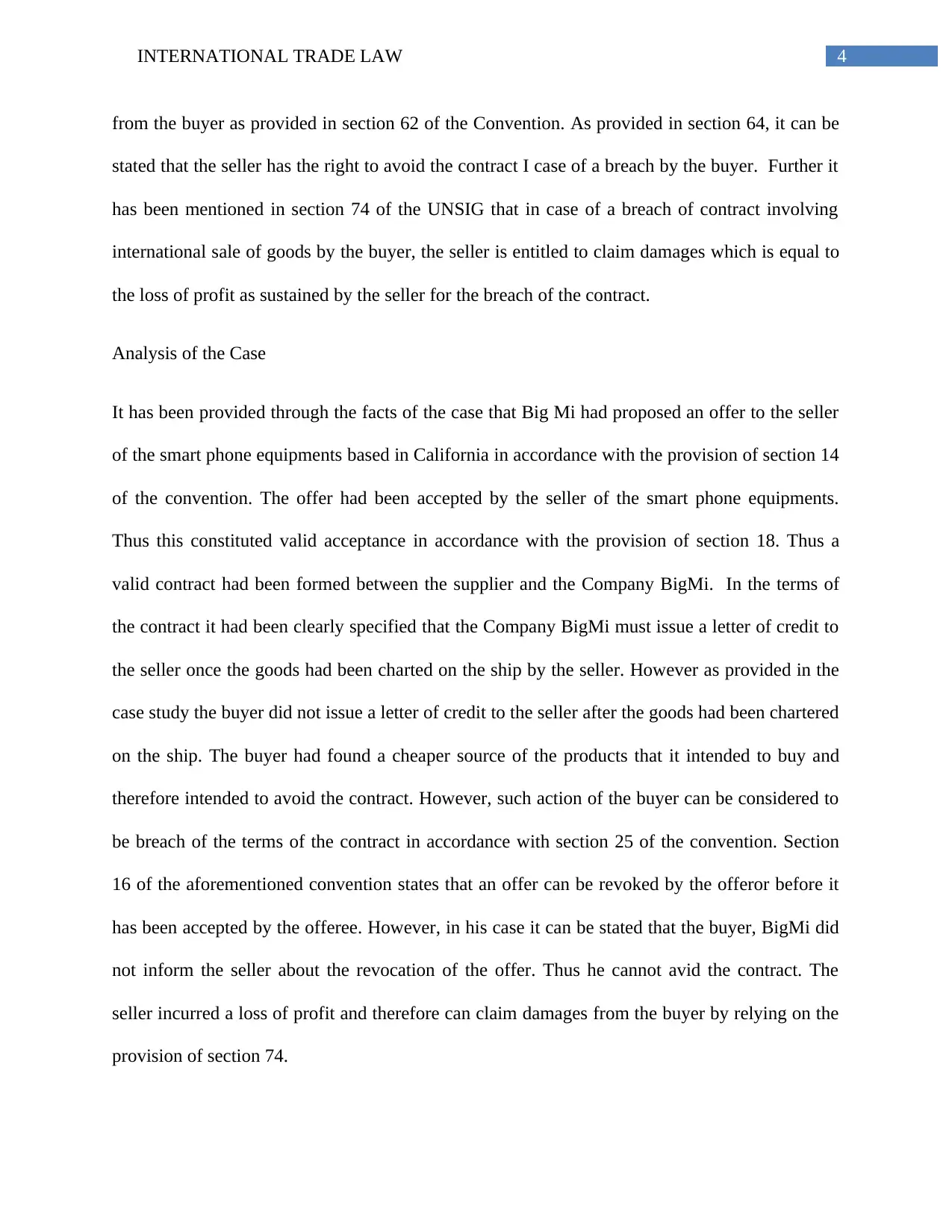
4INTERNATIONAL TRADE LAW
from the buyer as provided in section 62 of the Convention. As provided in section 64, it can be
stated that the seller has the right to avoid the contract I case of a breach by the buyer. Further it
has been mentioned in section 74 of the UNSIG that in case of a breach of contract involving
international sale of goods by the buyer, the seller is entitled to claim damages which is equal to
the loss of profit as sustained by the seller for the breach of the contract.
Analysis of the Case
It has been provided through the facts of the case that Big Mi had proposed an offer to the seller
of the smart phone equipments based in California in accordance with the provision of section 14
of the convention. The offer had been accepted by the seller of the smart phone equipments.
Thus this constituted valid acceptance in accordance with the provision of section 18. Thus a
valid contract had been formed between the supplier and the Company BigMi. In the terms of
the contract it had been clearly specified that the Company BigMi must issue a letter of credit to
the seller once the goods had been charted on the ship by the seller. However as provided in the
case study the buyer did not issue a letter of credit to the seller after the goods had been chartered
on the ship. The buyer had found a cheaper source of the products that it intended to buy and
therefore intended to avoid the contract. However, such action of the buyer can be considered to
be breach of the terms of the contract in accordance with section 25 of the convention. Section
16 of the aforementioned convention states that an offer can be revoked by the offeror before it
has been accepted by the offeree. However, in his case it can be stated that the buyer, BigMi did
not inform the seller about the revocation of the offer. Thus he cannot avid the contract. The
seller incurred a loss of profit and therefore can claim damages from the buyer by relying on the
provision of section 74.
from the buyer as provided in section 62 of the Convention. As provided in section 64, it can be
stated that the seller has the right to avoid the contract I case of a breach by the buyer. Further it
has been mentioned in section 74 of the UNSIG that in case of a breach of contract involving
international sale of goods by the buyer, the seller is entitled to claim damages which is equal to
the loss of profit as sustained by the seller for the breach of the contract.
Analysis of the Case
It has been provided through the facts of the case that Big Mi had proposed an offer to the seller
of the smart phone equipments based in California in accordance with the provision of section 14
of the convention. The offer had been accepted by the seller of the smart phone equipments.
Thus this constituted valid acceptance in accordance with the provision of section 18. Thus a
valid contract had been formed between the supplier and the Company BigMi. In the terms of
the contract it had been clearly specified that the Company BigMi must issue a letter of credit to
the seller once the goods had been charted on the ship by the seller. However as provided in the
case study the buyer did not issue a letter of credit to the seller after the goods had been chartered
on the ship. The buyer had found a cheaper source of the products that it intended to buy and
therefore intended to avoid the contract. However, such action of the buyer can be considered to
be breach of the terms of the contract in accordance with section 25 of the convention. Section
16 of the aforementioned convention states that an offer can be revoked by the offeror before it
has been accepted by the offeree. However, in his case it can be stated that the buyer, BigMi did
not inform the seller about the revocation of the offer. Thus he cannot avid the contract. The
seller incurred a loss of profit and therefore can claim damages from the buyer by relying on the
provision of section 74.
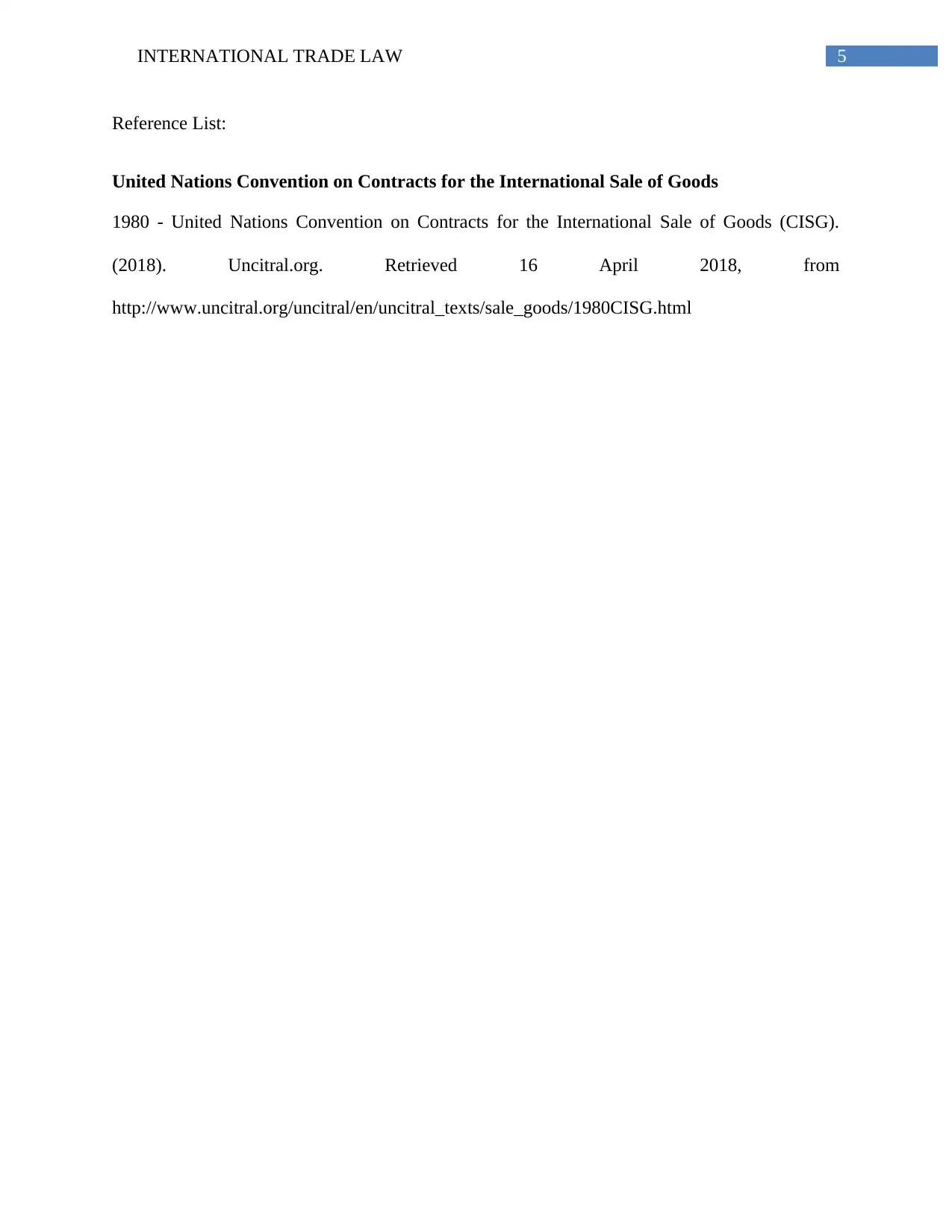
5INTERNATIONAL TRADE LAW
Reference List:
United Nations Convention on Contracts for the International Sale of Goods
1980 - United Nations Convention on Contracts for the International Sale of Goods (CISG).
(2018). Uncitral.org. Retrieved 16 April 2018, from
http://www.uncitral.org/uncitral/en/uncitral_texts/sale_goods/1980CISG.html
Reference List:
United Nations Convention on Contracts for the International Sale of Goods
1980 - United Nations Convention on Contracts for the International Sale of Goods (CISG).
(2018). Uncitral.org. Retrieved 16 April 2018, from
http://www.uncitral.org/uncitral/en/uncitral_texts/sale_goods/1980CISG.html
⊘ This is a preview!⊘
Do you want full access?
Subscribe today to unlock all pages.

Trusted by 1+ million students worldwide
1 out of 6
Related Documents
Your All-in-One AI-Powered Toolkit for Academic Success.
+13062052269
info@desklib.com
Available 24*7 on WhatsApp / Email
![[object Object]](/_next/static/media/star-bottom.7253800d.svg)
Unlock your academic potential
Copyright © 2020–2026 A2Z Services. All Rights Reserved. Developed and managed by ZUCOL.




